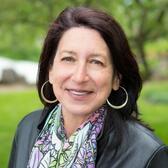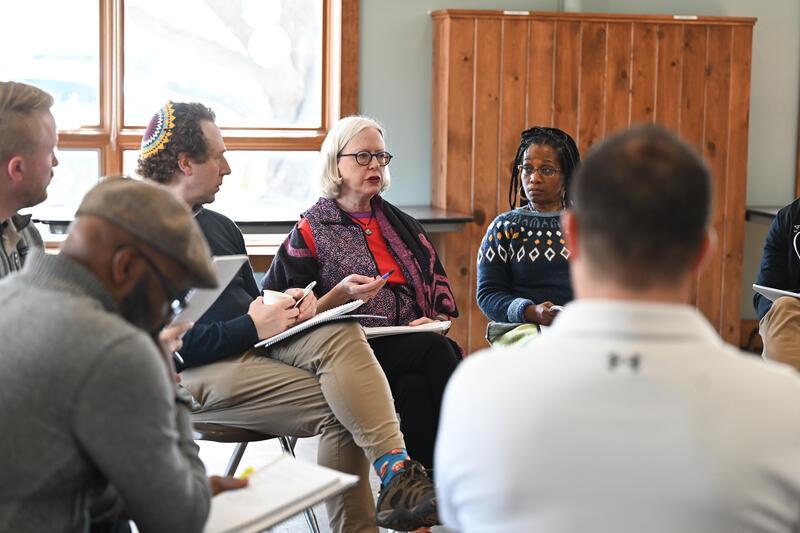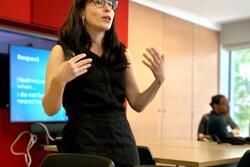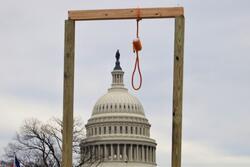Finding Common Ground, One Conversation At A Time
“I could never talk to someone who voted for Trump. He stands for everything I’m against,” said Lisa*, a 70-year-old woman.
We were chatting at a Kabbalat Shabbat service in the basement of a small synagogue in Buffalo in December 2024. I told Lisa about a series of facilitated conversations between members of a liberal Jewish synagogue and a conservative Evangelical church in which I had participated and sent her an article I wrote about the experience.
As a former Jewish community relations professional, I'm dedicated to building bridges with other faith, cultural, and ethnic communities. After Donald Trump was elected to a second term, these potentially challenging spaces felt especially important to me.
At the next month’s Shabbat service, Lisa approached me. “I read your article, and it inspired me to read a book about a former white supremacist who now advocates against hate and racism. I changed my mind, and I’d like to attend the next meeting.”
After the election, Lisa was concerned about the country’s increased political polarization. Like many Jews, she was also anxious about the rise of antisemitism and the increased questioning of Israel's legitimacy. But as a former teacher, she said, “We have to learn to speak with each other.”
There's evidence that learning to speak with each other really helps. A study with over 35,000 participants recently published in Science found that 23 of the 25 studied interventions lowered partisan animosity, especially when people were able to find common ground. One such intervention is a video, #Open Your World, which “highlights relatable sympathetic individuals with different political beliefs, and emphasizes common identities shared by rival partisans.”
In the video, two people engage in a cooperative activity (building furniture) while answering questions about their identities and beliefs. The two people have diametrically opposite views: for example, a man who states feminism today is "man-hating" is paired with a woman who describes herself as "100% feminist." At the end of the activity, they are given a choice to further discuss their differences over a beer or walk out. They all choose to stay.
The challenge is to bring people together in natural and consistent settings, not only in contrived situations. Here's one initiative I recently participated in.
A day after the 2024 election, I drove 30 minutes from my home in Buffalo to a local suburban Evangelical church. On my way, the Harris/Walz lawn signs turned into Trump/Vance signs, the potholes disappeared, and the manicured lawns and elaborate Halloween decorations multiplied.
I was attending the first of two workshops for people with divergent political views. Two local faith leaders, an Evangelical pastor and a Reform rabbi, had trained as facilitators over the past year with Resetting the Table (RTT), a national political mediation group.
RTT’s goal is to work with folks from disparate backgrounds and views and have difficult but civil conversations about issues important to them. To listen deeply, to understand the other, to challenge each other—but not to change hearts and minds. The vision is to build a less polarized country, one conversation at a time.
Participants were greeted by the pastor and rabbi with a warm welcome and a handshake. We spent the first workshop developing a safe, comfortable space for conversations. We put on name tags and shared a meal.
The pastor started the session with an icebreaker: “Put your hand up if you have lost a relationship with a friend or family member because of our political environment.” Two-thirds of the hands went up. Suddenly, we had a common bond. “I don’t talk to my sister who lives outside of Atlanta and she’s very conservative. But as I age, I really miss and need her,” one participant shared.
Next was an even more powerful question, discussed in smaller groups: “What single event in your life has changed your moral/political beliefs?” One woman in her 20s shared her experience of being saved by Jesus. A younger man, John*, shared a story about his good friend who died of a blood clot. Believing the COVID vaccine caused his friend's death, he refused to be vaccinated and was fired from his job.
At first, I was speechless. How could an educated person believe this unscientific falsehood? My husband is an infectious disease scientist, and during the COVID pandemic, I lived with daily epidemiology updates. Yet sitting next to John, I saw the pain and frustration in his eyes, and all I could say was how very sorry I was for his loss.
I shared my own pivotal moral moment: As a Boston University junior studying abroad at a London college in the 1980s, I joined a spring break trip to the former Soviet Union. With me, I brought banned items and Judaica to refuseniks (Jews refused emigration.) All religion was still banned in 1983 Communist Russia. I was trained by Jewish organizers to anticipate and deal with interrogation by Russian officials, given 83 kilograms of kosher food, banned books, ritual items, and the names of those I would meet for the drop-off. I was interrogated by border guards and my belongings were searched. The two female guards who searched me didn't find the addresses of those I was to meet. I was eventually released with a warning and allowed into the country with everything I had brought. Some of my fellow non-Jewish students wore the Star of David necklaces I asked them to wear, quiet participants in my defiant mission to bring “illegal items” to fellow Jews.
During the workshop reflection period, a man in my group remarked on a similarity between John and me: We both were fighting institutions. John refused to believe the science and get the COVID vaccine. I defied authoritarianism and brought religious items to Russian Jews. Who would ever have thought that John and I had anything in common?
And that was the point—not to change deeply held opinions, but to hear and acknowledge each other, to see our common humanity.
In the small groups, we explored politically and morally charged topics: undocumented immigrants, mandatory photo ID at the polls, vaccines in the workplace, and women’s health. Interestingly, there was consensus on abolishing capital punishment, as both faith groups believed in the sanctity of life.
On the other side of the life cycle, a young man stated that for him, someone who had an abortion was committing murder because of an inconvenience. A participant deeply inhaled and exhaled. Later she commented to me, “We are definitely on different planets.” I asked her why she had attended. “This is really hard work. We are all set in our own beliefs, but we need to listen without judgement and try to accept one another,” she answered.
The day after the inauguration, the same rabbi and pastor organized a morning and an evening gathering at a coffee shop so that we could practice our listening and reflecting skills in this fraught moment. For these sessions, they put aside their facilitation role and participated in the discussions.
I attended the daytime meeting, which attracted mostly retirees who were connected to the liberal synagogue. The nighttime meeting, I learned later, attracted younger church members who worked during the day. I noticed that, as in my previous workshop, I was one of the few female participants. I wondered about the gender imbalance: Did women think the sessions would lead to too much conflict, something that women are socialized to shy away from? Did men feel more comfortable with the male clergy facilitators? Or did women simply feel exhausted? Many liberal women I know participated in the 2017 Women’s March, mailed thousands of “get out the vote” reminder postcards and travelled to Pennsylvania and Michigan to help get out the vote for Kamala Harris. Maybe after Trump's victory, they felt defeated.
As promised, Lisa, the woman from my synagogue, attended the daytime meeting, quietly listening to the conversation in her four-person group. A liberal, Jewish young man wanted to talk about the Israel-Hamas War. He advocated for the immediate release of all the hostages and also voiced his concern for the plight of innocent Gazans. The pastor repeated back what he heard and then emphasized his own stronger view, that all hostages should be released before any ceasefire took place.
“Honestly, I was shocked the pastor was even more strident,” Lisa remarked to me later. Nevertheless, she saw the value of the sessions and thought she would attend again.
Over the years, I have worked to amplify the voices of different groups of people: Israeli Orthodox Jews and Palestinians working on mutual recognition and respect, Holocaust survivors who wanted their stories to be preserved, and people impacted by the racist shooting in Buffalo in 2022. Fostering these conversations is important to me, and I will continue to show up for those who have suffered from hate, just as people have done for me. As polarization intensifies, we need more opportunities to meet, listen, and be heard by those who think differently from us.
May this important work continue now, for the next four years, and forever.
*name changed for confidentiality







